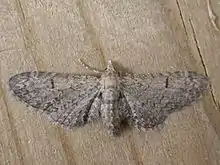| Eupithecia ultimaria | |
|---|---|
 | |
| Scientific classification | |
| Domain: | Eukaryota |
| Kingdom: | Animalia |
| Phylum: | Arthropoda |
| Class: | Insecta |
| Order: | Lepidoptera |
| Family: | Geometridae |
| Genus: | Eupithecia |
| Species: | E. ultimaria |
| Binomial name | |
| Eupithecia ultimaria | |
| Synonyms | |
| |
Eupithecia ultimaria, the Channel Islands pug, is a moth of the family Geometridae. The species was first described by Jean Baptiste Boisduval in 1840. It can be found in Europe, where it is found in Portugal and Spain, coastal western and southern France, Italy, the Mediterranean islands including Cyprus and Greece. It is also found in southern England and the Channel Islands. Furthermore, it is present in North Africa (Morocco, Algeria, Tunisia, Libya, Egypt), Lebanon, Israel, Iraq and Iran.[2]
The wingspan is 13–17 mm. Adults are on wing from late April to June and again from August to late October in two generations per year.
The larvae feed on Tamarix gallica.
References
- ↑ Yu, Dicky Sick Ki. "Eupithecia ultimaria Boisduval 1840". Home of Ichneumonoidea. Taxapad. Archived from the original on March 24, 2016.
- ↑ Notes on Geometridae of the Maltese Islands with new records (Lepidoptera: Geometridae)
External links
Wikimedia Commons has media related to Eupithecia ultimaria.
- Kimber, Ian. "70.152 BF1855a Channel Islands Pug Eupithecia ultimaria Boisduval, 1840". UKMoths. Retrieved 4 July 2019.
- Lepiforum e.V.
This article is issued from Wikipedia. The text is licensed under Creative Commons - Attribution - Sharealike. Additional terms may apply for the media files.